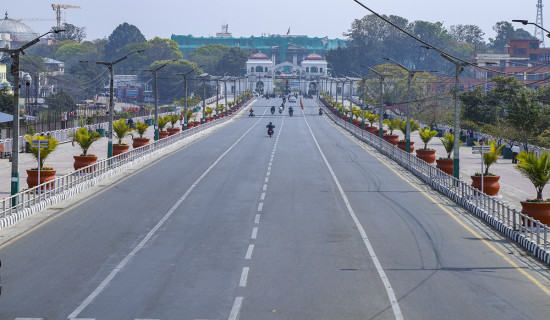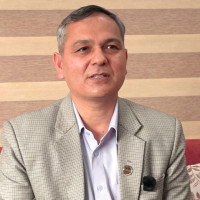- Wednesday, 4 March 2026
Promote Mental Health For Happiness
According to a report by Public Health Concern (PHC) Nepal, mental health and substance use disorders affect 13 per cent of the world’s population — about 970 million people. The report also notes that this number has been steadily increasing each year. While physical health is widely discussed and prioritised, mental well-being still does not receive the attention it deserves, even today.
In countries like Nepal, where Ayurveda has a profound influence and promotes meditation and yoga practices for mental and spiritual well-being, mental health still tends to be overlooked. As human civilisation advances, terms like “stress” and “tension” have become commonplace, even among young children. However, their true meaning and the impact they have on overall health are not well understood. More importantly, the need to acknowledge and address mental health as essential to living a healthy and happy life has become urgent.
Stigma
The World Health Organisation (WHO) estimates that one in four people will be affected by mental or neurological disorders at some point in their lives. Yet, due to stigma, cultural norms, and societal expectations, many individuals suffer in silence. Even today, talking openly about mental health remains uncomfortable for many across the globe, largely due to fear of being excluded by family, friends, or employers.
World Mental Health Day was first observed by the World Federation for Mental Health in 1992. From 1994 onwards, WHO began officially supporting it, observing October 10 each year with annual themes to raise awareness. In a significant development, the United Nations General Assembly passed a landmark resolution on mental health and psychosocial support in June 2023 — recognising mental health as a standalone global concern.
Although October 10 is officially observed as Mental Health Day in Nepal, May has been recognised as Mental Health Awareness Month in the United States since 1949. Over time, many Western and Asian countries have also begun marking May as a time to raise awareness about mental health. Nepal can benefit from similar initiatives.
According to PHC Nepal, anxiety disorders currently affect 284 million people worldwide, while depression impacts 264 million. Other mental health conditions include alcohol use disorder (107 million), drug use disorder (71 million), bipolar disorder (46 million), schizophrenia (20 million), and eating disorders (16 million). Despite these large numbers, mental health conditions are still considered taboo in much of the world, particularly in countries like Nepal. As a result, people often hesitate to seek help.
Those struggling with mental illness are frequently labelled as “mad” or “crazy”—harmful stereotypes that discourage individuals from addressing their issues. In Nepal, although mental health is starting to be discussed more within professional sectors, it has not yet become a common topic in everyday conversation. Just as we take medication or rest for physical ailments like the flu or headaches, mental health also requires care. Sadly, people often hesitate to consult psychiatrists for fear of being stigmatised. It is essential to raise awareness among families, educators, and communities to accept that mental health problems are normal and treatable.
Treatment can take many forms: conventional medicine, Ayurveda, homeopathy, physical exercise, meditation, and yoga. Gardening has also been shown to improve mental health. Many elderly people say that spending time with grandchildren soothes their minds, while interactions with pets and nature also foster peace and well-being. Caring for others—including the elderly and those with disabilities — can bring a sense of purpose and emotional balance.
However, technological advancement has brought with it increasing isolation. Many parents have limited time for their children, and adult children often struggle to care for their ageing parents. While the internet and artificial intelligence offer some relief, they cannot address emotional loneliness. Anxiety and depression can result from isolation, though hereditary factors also play a role and may require medication.
Governments — especially in countries like Nepal — must create strategic plans to address mental health. Schools should incorporate mental health education, and teachers, parents, and guardians need to be trained to recognise and respond to signs of distress. Professional support through counselling or medical care must be normalised.
As time progresses, mental health issues are increasingly being discussed among professionals. Many workplaces now offer courses to help employees stay mentally fit and perform better. Some organisations even organise retreats to support staff and community members, providing opportunities to connect, share, and enhance overall mental well-being. However, such conversations are still rare within households. Family members often avoid talking openly about mental health due to the fear of being ostracised or treated as outcasts.
Psychological barriers
This hesitation reflects deeper societal attitudes and psychological barriers. Educators have a critical role to play in addressing these issues, helping communities understand that mental health is just as important as physical health. Unfortunately, while the topic is now more visible, efforts often fall short of achieving the intended impact. Children should be taught life skills and be surrounded by supportive adults to help them cope with emotional challenges.
Similarly, senior citizens living alone must have access to care systems that provide both emotional and physical support. Nepal’s traditional values offer many lifestyle habits that promote mental health, spirituality, yoga, gardening, caring for pets and elders, and spending time with family. These practices should be preserved and passed on as tools for leading a happy and fulfilling life.
(Sharma is a senior journalist and women’s rights advocate. namrata1964@yahoo.com or on X @NamrataSharmaP.)






-original-thumb.jpg)










